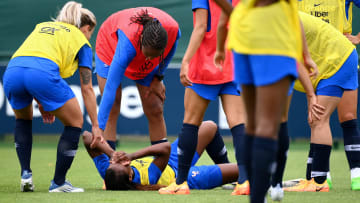
Faye White on the England teams the Lionesses can replicate at Euro 2022
A potentially watershed summer awaits for women’s football in England, as the Lionesses host a major tournament for the first time since 2005, attempt to reach a major tournament final for the first time since 2009, and vie to win a major tournament for the first time in their history.
While the latter remains uncharted territory for England, no one is better placed to offer insight into the two former experiences than ex-Arsenal centre-back Faye White, who captained the Lionesses on home soil at Euro 2005, and to the final of Euro 2009.
Euro 2005 was on a vastly different scale to Euro 2022 – the venues were all in the north of England, with the City of Manchester Stadium in use for the opening game and Ewood Park the ground of choice for the final. Women’s football was an amateur sport in the UK and the England team were not full-time professionals. The team returned to their day jobs following the tournament’s conclusion, while media coverage was comparatively scarce.
As a result, England’s 2005 team were under a different kind of pressure to what the Lionesses of Euro 2022 will experience; today’s team carry the burden of a nation’s baited expectation, while the onus was on the team of 17 years ago to further their sport, knowing a big performance could change the face of women’s football in the UK forever.
„We always knew we had to grow the exposure of the game, so that’s why we had pressure,“ White told 90min. „But now with extra scrutiny, more media – they’ve got to deliver haven’t they?
„We always knew that we had to win a tournament. The only thing that was going to get us coverage was if we won a tournament. But that’s so hard to do, with the funding we had compared to the top nations; we were on a development level.“
Despite a memorable 3-2 win in their opening game against Finland, England exited at the group stages of Euro 2005 following defeats to Denmark and Sweden. However, just four years later the Lionesses came close to that elusive major tournament win as they reached the final of Euro 2009.
„No one expected us to get to the final,“ White recalled. „For us at that time, we couldn’t beat every team that was put in front of us, we knew that, but we knew we were growing and we got that belief in the team and we got all the way to the final, which was massive. I look back at that as my biggest moment.
„It was a big thing in 2009 and I think it doesn’t get talked about a lot, almost like it’s forgotten and I don’t know why because it’s something to look back on and say: ‘we got there without all the funding, and we need to get there again’.“
England came up against the might of double world and six-time European champions Germany in the final and ultimately suffered a 6-2 defeat. Their illustrious opposition were not the only thing they had to contend with.
„My first few years at England were in men’s kit and we’d get large,“ White recalled with a smile. „And you’d be running against Germany who were world and European champions with what felt like a parachute on your back because they were so big.“
White retired in 2013, calling time on a 17-year career that saw her collect 90 England caps. Such is her legacy, she has had a plaque installed in her honour in Horsham – the town where she kickstarted her grassroots career and earned her maiden England call-up as a teenager – as part of Nationwide and the FA’s Mutual Respect campaign.
The defender began her career with women’s football almost a taboo, and hung up her boots with the game on the cusp of professionalism. The sport has blossomed further during her retirement, and Euro 2022 can be another catalyst for change.
„All my youth I’d had: ‘girls don’t play football, why are you doing this? You’re a bit different‘,“ White said. „But I just didn’t listen to it. I didn’t care, I just loved it so much that I thought: ‘why shouldn’t I? I’m just kicking a ball around. Why can’t I do that?’“